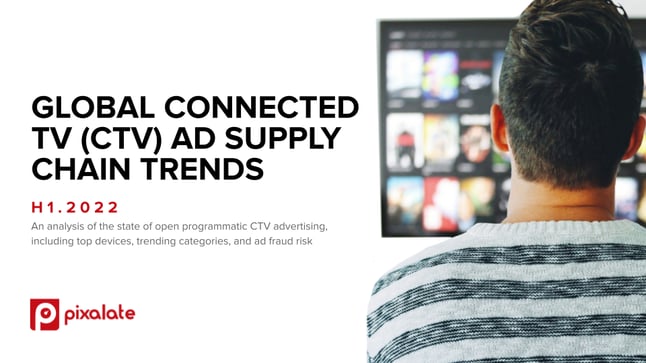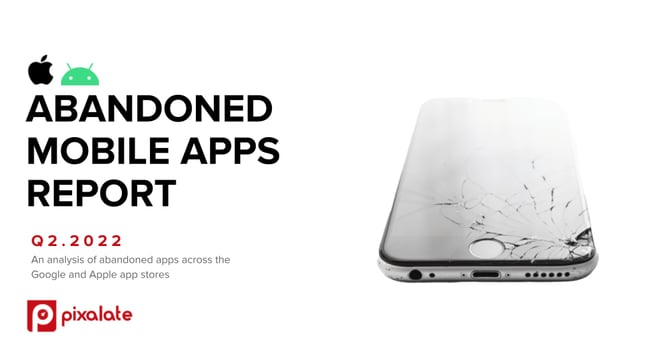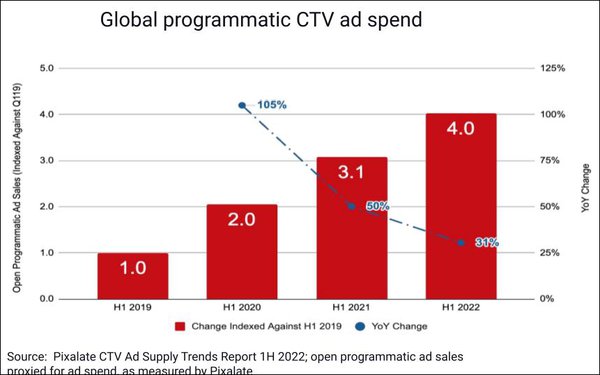
This week's review of ad fraud and privacy in the digital advertising space:

Pixalate, the market-leading fraud protection, privacy, and compliance analytics platform for Connected TV (CTV) and Mobile Advertising, today released the H1 2022 Global Connected TV (CTV) Ad Supply Chain Trends Report, a comprehensive analysis of the state of open programmatic CTV advertising through the first half of 2022.

Pixalate, the market-leading fraud protection, privacy, and compliance analytics platform for Connected TV (CTV) and Mobile Advertising, today released the Abandoned Mobile Apps Report: Q2 2022, showing that over 1.6 million apps between the Google Play Store and Apple App Store appear to have been “abandoned,” meaning that they haven’t been updated in over two years.
Pixalate’s analysis also found 306k+ “Super-Abandoned” apps (5+ years with no update), which are spread almost evenly between the two stores, with 141k in the Apple App Store and 166k+ in the Google Play Store.
.webp?width=646&name=MOBILE-TO-CTV%20SPOOFING%20(ROKU).webp)
Global Connected TV (CTV) programmatic ad spend continues to soar, rising 32% year-over-year according to Pixalate’s latest estimates, but this rapid growth also makes CTV a ripe target for fraudsters.
Pixalate conducted a study from June-August 2022 and found that 30% of spoofed Roku traffic appears to actually originate from mobile devices. Of note, Pixalate data indicates that these ad fraud spoofing attempts seem to originate from iOS devices far more often than Android devices. To see Pixalate's full findings, please visit here.

Digiday published a story featuring the findings of Pixalate's H1 Global Connected TV (CTV) Ad Supply Chain Trends Report. The article states:
"In a 2022 report published this month on the global CTV ad supply chain, Pixalate, a fraud and privacy software company, found in the first half of 2022 that 94% of U.S. households are now reachable through open programmatic CTV ads. This is up from 86% in 2021, making for a 10% year-over-year increase and signifying steady growth even as providers and content increase."

MediaPost published a summary of Pixalate's H1 Global CTV Ad Supply Chain Trends Report, saying:
"Global connected TV (CTV) ad spending rose 31% in first-half 2022 as compared with 1H 2021, according to Pixalate’s latest CTV/mobile ad supply trends report.
The report, which uses open programmatic ad sales as measured by Pixalate as a proxy for ad spend, does not provide spend by dollar amount estimates, but says global programmatic CTV spend has increased by four times over the past three years."
![]()
Apple Insider reported on Pixalate's Q2 Abandoned Mobile Apps Report, which showed a 16% in abandoned apps in the Google Play store from April 1 - June 30, 2022.
"Apps that haven't been updated in a while may pose a security risk to users, and a report on Tuesday from Pixalate shows that Android app abandonment has increased in recent years. A lack of a privacy policy is also a common feature of these apps, with 23% of abandoned apps not having one."
*By entering your email address and clicking Subscribe, you are agreeing to our Terms of Use and Privacy Policy.
These Stories on Weekly Recaps
*By entering your email address and clicking Subscribe, you are agreeing to our Terms of Use and Privacy Policy.

Disclaimer: The content of this page reflects Pixalate’s opinions with respect to the factors that Pixalate believes can be useful to the digital media industry. Any proprietary data shared is grounded in Pixalate’s proprietary technology and analytics, which Pixalate is continuously evaluating and updating. Any references to outside sources should not be construed as endorsements. Pixalate’s opinions are just that - opinion, not facts or guarantees.
Per the MRC, “'Fraud' is not intended to represent fraud as defined in various laws, statutes and ordinances or as conventionally used in U.S. Court or other legal proceedings, but rather a custom definition strictly for advertising measurement purposes. Also per the MRC, “‘Invalid Traffic’ is defined generally as traffic that does not meet certain ad serving quality or completeness criteria, or otherwise does not represent legitimate ad traffic that should be included in measurement counts. Among the reasons why ad traffic may be deemed invalid is it is a result of non-human traffic (spiders, bots, etc.), or activity designed to produce fraudulent traffic.”

